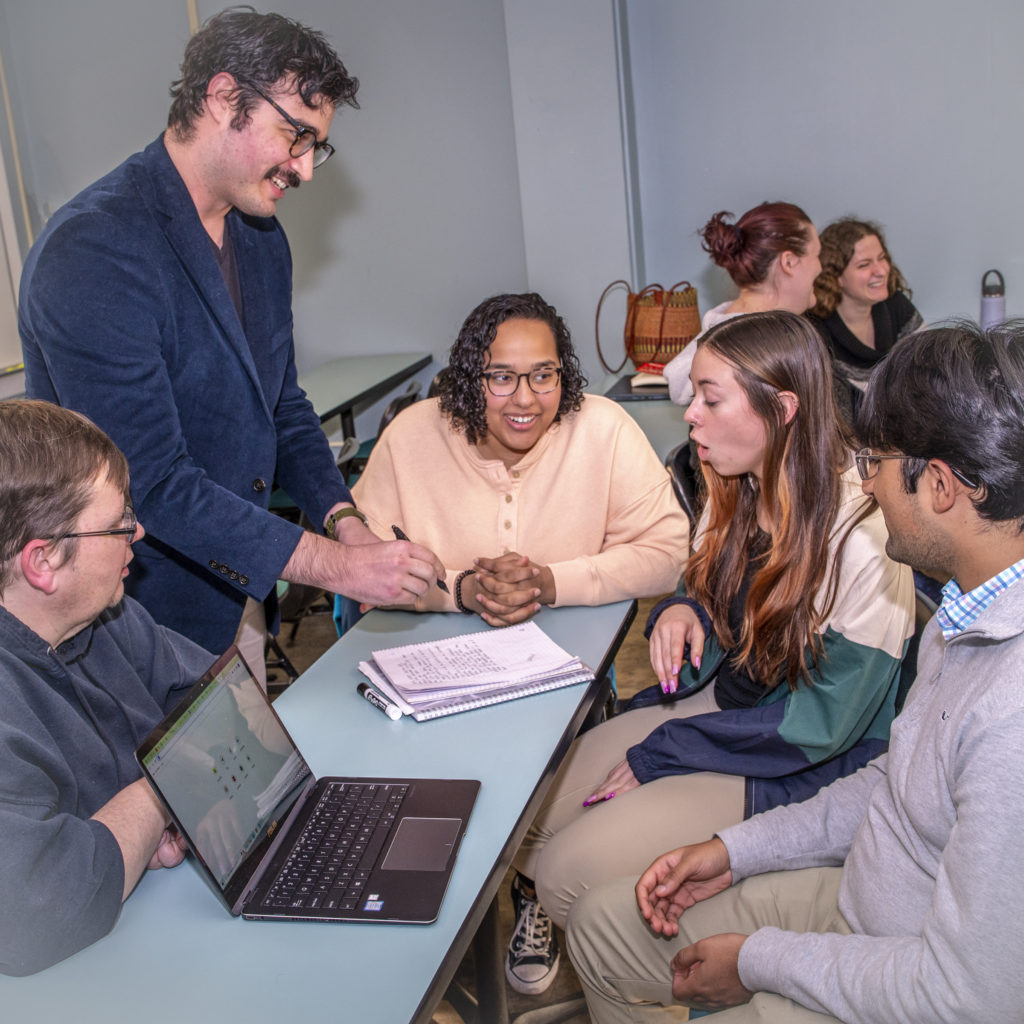Growing Career Paths: In-Demand Jobs & How to Prepare for Them
Explore growing career paths in healthcare, education, business, and criminal justice. Learn how Sage’s undergrad and grad programs prepare you for success.
Take a look at our Program Finder to learn about the academic programs we offer.
Prepare to become a Licensed Mental Health Counselor with a master’s degree in counseling from our accredited program.

Licensed Mental Health Counselors have a master’s degree in counseling and provide evaluation, assessment, treatment and consultation services for adults and children, families and communities.
60
credits
$805
per-credit
$3,415 Graduate Assistantships available per semester (enrolled in a minimum of 6 credits per semester)
3 years
to graduate
In person
With evening courses (check out our online version of this program, too.)

Licensed Mental Health Counselors have a master’s degree in counseling and provide evaluation, assessment, treatment and consultation services for adults and children, families and communities.
60 credits
(8-credit practicum also available)
$805 per-credit
$3,415 Graduate Assistantships available per semester
(enrolled in a minimum of 6 credits per semester)
3 years
to graduate
In Person
program with evening classes
Looking for an online program? We have that, too!
Russell Sage College is the region’s premier institution for health professions, offering the most comprehensive range of undergraduate and graduate programs.
This master’s in Mental Health Counseling and Community Psychology is approved by the New York State Education Department’s Office of the Professions. Graduates are eligible to take the exam required to practice as a Licensed Mental Health Counselor in New York state.
(We offer a Community Psychology master’s for those not seeking licensure as a LMHC.)
Master’s candidates who want to work with individuals with mental health needs and criminal justice involvement may add a certificate in Forensic Mental Health.
Candidates may also apply for the Credentialed Alcohol and Substance Abuse Counselor in Training (CASAC-T) certification, administered by the New York State Office of Substance Abuse Services.
Take academic, clinical, and research classes in the behavioral sciences and build therapeutic skills under the supervision of licensed professionals. In addition to core courses, we offer courses in family counseling, psychopharmacology, and substance abuse counseling.
Hands-on experiences will build your understanding of psychological research and counseling practice and offer opportunities for professional development.
As a counseling psychology master’s candidate, you will work therapeutically with clients under the supervision of licensed, registered professionals.
Recent settings include the Capital District Psychiatric Center, Albany Medical Center Behavioral Pediatrics, and the Mid-Hudson Forensic Psychiatric Center. Our internship coordinator helps you search for placements.
You will also conduct research and may be eligible for research funding from Russell Sage’s Broughton Graduate Fellowship or Paul Search Research Award in Community Psychology, or from the American Psychological Association.
Students have presented research at the American Psychological Association’s national and regional conferences and Russell Sage College’s Graduate Research symposium.

While your career path is a personal choice, we wanted to help you by breaking down the difference in licensing requirements in New York state, so you can understand your educational journey, licensing requirements, and scope of practice for each route.
Applicants should complete Russell Sage’s graduate program application and provide:
Our master’s in Mental Health Counseling and Community Psychology program is 60 credits and can be completed full time in approximately three years. The program has been registered with New York State Education Department as meeting the educational qualifications leading to licensure as a Mental Health Counselor in New York State.
Students enrolled in the Mental Health Counseling and Community Psychology Masters Program may also elect to pursue a Certificate in Forensic Mental Health.

This master’s degree in Counseling and Community Psychology prepares students for work as Licensed Mental Health Counselors in accordance with the best practices in education and training recognized by the Master’s in Psychology and Counseling Accreditation Council. Graduates have a foundation in ethical practices, understand intersectionality of multiple identities and respect multicultural perspectives.
The M.A. in Counseling and Community Psychology Program is accredited by the
Masters in Psychology and Counseling Accreditation Council (MPCAC) for the period of November 2020 through November 2028.
| Number of applicants | 58 |
| Number of acceptances | 54 |
| Percent accepted | 93% |
| Number of enrollees | 35 |
| Percent enrolled | 65% |
| Number of total students (part-time and full-time) | 84 |
| Graduates (Aug/Dec/May) | 19 |
| Number of core full-time faculty | 7 |
| Faculty to student ratio | 1:12 |
| Courses taught by adjunct faculty | 19% |
| Percent of graduates from 2019 to 2021 who are now Licensed Mental Health Counselors in NYS | 60% |
M.A. in Counseling & Community Psychology 2022-2023

Our master’s program comes with a deep, Russell Sage-level of support from an assigned faculty advisor who works with you to ensure your success.

Associate Professor of Psychology, Chair and Graduate Program Director

Professor of Psychology

Professor of Psychology

Assistant Professor of Mental Health Counseling and Community Psychology
Gayle Morse, Ph.D., Professor “Students with a master’s degree in counseling walk out the door with jobs. There’s such a need for counselors that they have jobs immediately.”

Graduates of Sage’s Mental Health Counseling and Community Psychology program become Licensed Mental Health Counselors and enter private and group practices or join state and county agencies, health care systems, universities, school districts, human service agencies and more.
Six days after Ruth Martin’s internship at Unity House’s PROS ended, she returned as an employee. “This is my dream …
Amanda Abel ’23 is already applying her M.A. in Counseling and Community Psychology as a mental health counselor for Northpointe …
Kiara Maher is a Troy native and always knew of Russell Sage College as a “tight community.” But what really …
“I am motivated to work with underserved populations, specifically for nonprofits,” says Evangeline Murphy, who is pursuing a master’s degree …
Counseling and Community Psychology master’s degree candidate Nana Ama Boateng was one of five Russell Sage College students who participated …

Explore growing career paths in healthcare, education, business, and criminal justice. Learn how Sage’s undergrad and grad programs prepare you for success.

Explore what you can do with a psychology degree, including careers in clinical settings, education, business, and more. Discover how Russell Sage College equips students with versatile skills for a range of rewarding career paths. What Can I Do with a Psychology Degree? A psychology degree offers a versatile and intellectually rigorous foundation for understanding […]

Psychology is a broad and rewarding field, offering professionals the chance to make meaningful impacts in people’s lives. With a master’s degree in psychology, you gain access to a wide range of opportunities — whether you’re passionate about clinical work, human services, research, or specialized roles in schools, communities, and corporations. The need for mental […]

